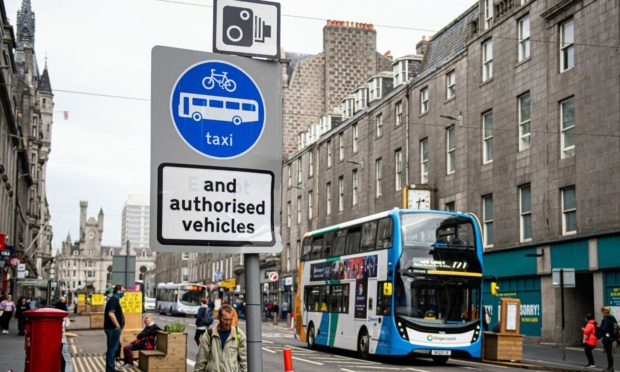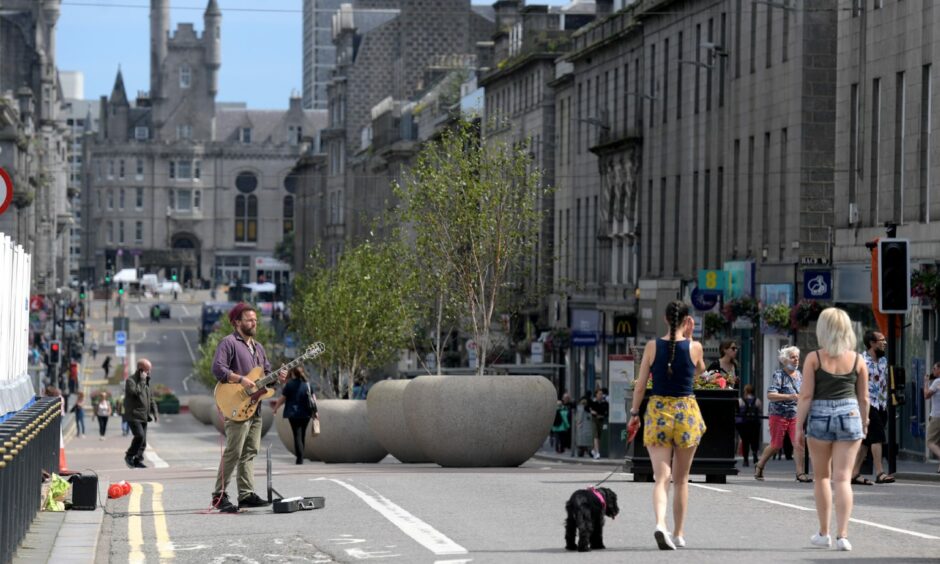Executives from Aberdeen’s major bus operators have united to pile pressure on the city council to give their vehicles access to Union Street once more.
Bosses at Stagecoach Bluebird and First Aberdeen have revealed their buses have been sat stationary in traffic four times as much since they were diverted around the pedestrianised zone on the Granite Mile.
Their interjection came only hours before a summit with council chiefs to discuss long term plans for the pedestrianisation of Union Street – though Town House sources claimed the firms’ on-board tracking data only told “part of the story”.
This week, the local authority published proposals for the future of the city centre – including a “prioritised” push to have part of Aberdeen’s main thoroughfare permanently closed off to traffic.
It would cover the same section, between Market Street and Bridge Street, which is already blocked off as part of the Covid physical distancing measures.
Currently, only buses and taxis are allowed to turn in and out of Market Street from Union Street, with a bus gate set up at the Adelphi.
However, Aberdeen Journals recently uncovered that the camera had not in operation since the turn of the year.
Promise of fuller consultation on long term plans for the Granite Mile
While buses are presently banned outright from Market Street to Bridge Street stretch – which contains the city’s seven busiest bus stops, council planners are open to exploring a partial pedestrianisation in the longer term proposals.
Such a move would result in a similar layout to Broad Street, where pedestrians, cyclists and buses share the space closed to cars.
That overhaul, of a far shorter road, cost £3.2 million in 2017 – while no price tag has yet been attached to the Union Street overhaul.
Several other roads around the city centre and West End could also be altered, as the council tussles to drag the city out of the Covid doldrums.
Ahead of a meeting with council chiefs today to discuss long term access to Union Street, the bus companies piled on the pressure.
Bosses of Aberdeen bus firms pen joint letter calling for access to be reinstated
Speaking exclusively to Aberdeen Journals, Stagecoach Bluebird managing director, Peter Knight, and First Aberdeen operations director, David Phillips, said: “The closure of Union Street has caused frustrating delays for people using buses to visit the city centre.
“From our on board vehicle tracking we can see that the time our vehicles are at a standstill in city centre traffic has increased by 300% when compared to that of when Union Street was open.
“We are fully in support of developments to make the city centre a more vibrant place to visit, live and work but any such development should not be at the detriment of sustainable travel choices – such as bus.
“We only have to look round the corner to Broad Street to see our very own shining example of how shared spaces can truly transform city centres.
“To support the recovery of the city centre we ask that there is no further delay in reinstating bus access to the section of Union Street which has been closed.”
In June 2020, the two firms accused the local authority of “misleading” them on plans for the temporary closure of Union Street – alleging they had been told they would retain access.
A spokesman for the ruling Conservative, Aberdeen Labour and independent coalition said: “I’m delighted that both Stagecoach and First Aberdeen fully support developments to make the city centre a more vibrant place to visit live and work.
“The bus companies will be aware the top 10 responses from the public included support for Union Street being at the heart of the city and for a pedestrianised central section of Union Street, from Market Street to Bridge Street.
“The report next Wednesday at committee is for councillors to consider all options, including the removal of current temporary spaces for people measures, and decide which options to bring back in November with detailed proposals.
“I would urge them to work with us to ensure that whatever the committee determines in November, it does so in full knowledge of the business case in front of us, rather than on board vehicle tracking that only tells part of a story.”

